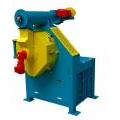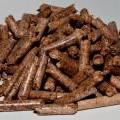Wood pellets from the North Coast - a valuable form of renewable energy
 Some of the fastest growing sources of renewable energy in the world are wind and solar and hopefully, also the humble wood pellet, if a Lismore based manufacturer, Bill McKee of McKeeco has his way.
Some of the fastest growing sources of renewable energy in the world are wind and solar and hopefully, also the humble wood pellet, if a Lismore based manufacturer, Bill McKee of McKeeco has his way.
Last month we reported on Australian Solar Timber’s belief that, with the right legislation in place, they would be in the position to supply the entire Macleay Valley with renewable energy as well as producing biochar, considered by scientists to be an excellent soil enhancer.
AST article
While there are a number of sources of renewable energy such as wind, solar, marine, hydrological, geothermal and bioenergy, according to Bill "what is most important is that the renewable sources best suited to a particular region are used. The sources of renewable energy that suit the New South Wales North Coast are bioenergy and solar due to the combination of sunshine and rainfall. Biomass fuel is stored solar energy".
The combination of North Coast councils utilising the biomass in their municipal solid waste and the forestry and timber industry utilising their residue could increase regional employment, create new skills and help curb Australia’s greenhouse gas emissions.
"Wood waste can be very efficiently converted into small pellets for subsequent burning to produce electricity". According to Mr McKee, the Lismore Recycling and Recovery Centre alone sees 2700 tonnes of wood and 8500 tonnes of waste paper through its gates each year. If this material was transformed into pellets they would be able to produce 130% of Lismore City Council’s energy needs.
McKeeCo has built the North Coast’s first ever locally manufactured machine (see top image) that compacts timber and other organic material such as grass clippings and even cotton trash into small pellets for subsequent energy production through one of the following processes: direct combustion, gasification or pyrolysis.
Two machines have already been sold by McKeeco into Tasmania and Mr McKee believes that with the emphasis many Councils are now placing on becoming 100% renewable, wood pellets stand out as a wonderful local energy resource. Coffs Harbour
 McKeeco’s machine can produce more than ½ tonne of pellets in less than an hour for electricity production and they are currently making a bigger version. “We can use almost any type of organic matter to make pellets including sawdust, tree tops and branches discarded during the processing and harvesting operations and also residues from organic crops” said Mr McKee.
McKeeco’s machine can produce more than ½ tonne of pellets in less than an hour for electricity production and they are currently making a bigger version. “We can use almost any type of organic matter to make pellets including sawdust, tree tops and branches discarded during the processing and harvesting operations and also residues from organic crops” said Mr McKee.
Wood pellets are already widely used in Europe for energy production and the south-east of USA is becoming a major exporter with factories sprouting up in Florida, Arkansas and Alabama.



